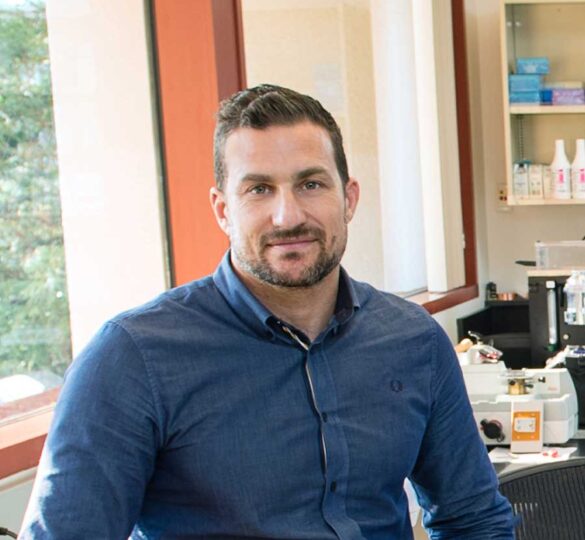Dr. Andrew Huberman: What Motivates Me as a Scientist
"What motivates me is the very real possibility of discovering something in my laboratory that can allow patients to see to see much better, for much longer periods of their life, and maybe even reverse blindness."

Andrew D. Huberman, PhD is a neuroscientist and tenured professor in the Department of Neurobiology at the Stanford University School of Medicine who has made many contributions to the brain development, brain plasticity, and neural regeneration and repair fields.
At the time of this video interview, he was a member of the Catalyst for a Cure Biomarker Initiative team funded by Glaucoma Research Foundation.
The main goal of Dr. Huberman’s laboratory is to understand how the retinal and brain circuits that underlie vision wire up during development, and to develop new strategies to monitor, prevent, and treat retinal ganglion cell loss in glaucoma and other neurodegenerative diseases.
Watch the Video
Video Transcript
Andrew Huberman, PhD: What motivates me, I confess, has shifted over the years. Maybe it’s just a product of getting older and maturing a little bit, I like to think. So, when I started in science I was just fascinated by the retina and by vision. I mean, humans are so visual. So much of our functioning and day to day life is reliant on vision: the ability to walk down the street, to drive, to read, to recognize the emotion in a face. I mean, we’re just such highly visual creatures. So, I used to just have a basic fascination with vision and I still maintain that fascination. Over the years, and in no small part due to my interactions with GRF, I’ve been placed in close contact with people who are suffering from vision loss.
One person who comes to mind in particular is – I attend some seeing eye dog events as part of my volunteer work, and I met this young woman – Juanita Herrera, who’s been blind with glaucoma since she was three years old. She has a seeing eye dog, fortunately. She’s incredibly functional in the world, given the complete lack of vision that she has, and yet you talk to her, and you realize that there are huge aspects of her life that rely on the dog, that rely on family care; and she so desperately wants to help other people suffering from vision loss. I was very inspired, and would love to be able to do something for patients like Juanita.
So, these days what really motivates me is the very real possibility of discovering something in my laboratory that can go into patients and allow them to see for much longer periods of their life, to see much better, and maybe even to recover vision from a state of being blind, to reverse blindness. That’s what gets me up earlier. That’s what keeps me up late. I’ve devoted my whole adult life, my professional life, to working on these cells – rental ganglion cells – in one form or another. Trying to understand their development, their function, their repair, and I don’t see myself working on anything else in my career, really. I plan to give my entire life to the study of the visual system.
I remain completely fascinated by vision as a property of the brain, of the human brain in particular, and the idea that there are people that are suffering from vision loss, to me, is a call to arms that we have to do something to reverse and treat this disease.
First posted on February 18, 2017; Last reviewed April 21, 2022